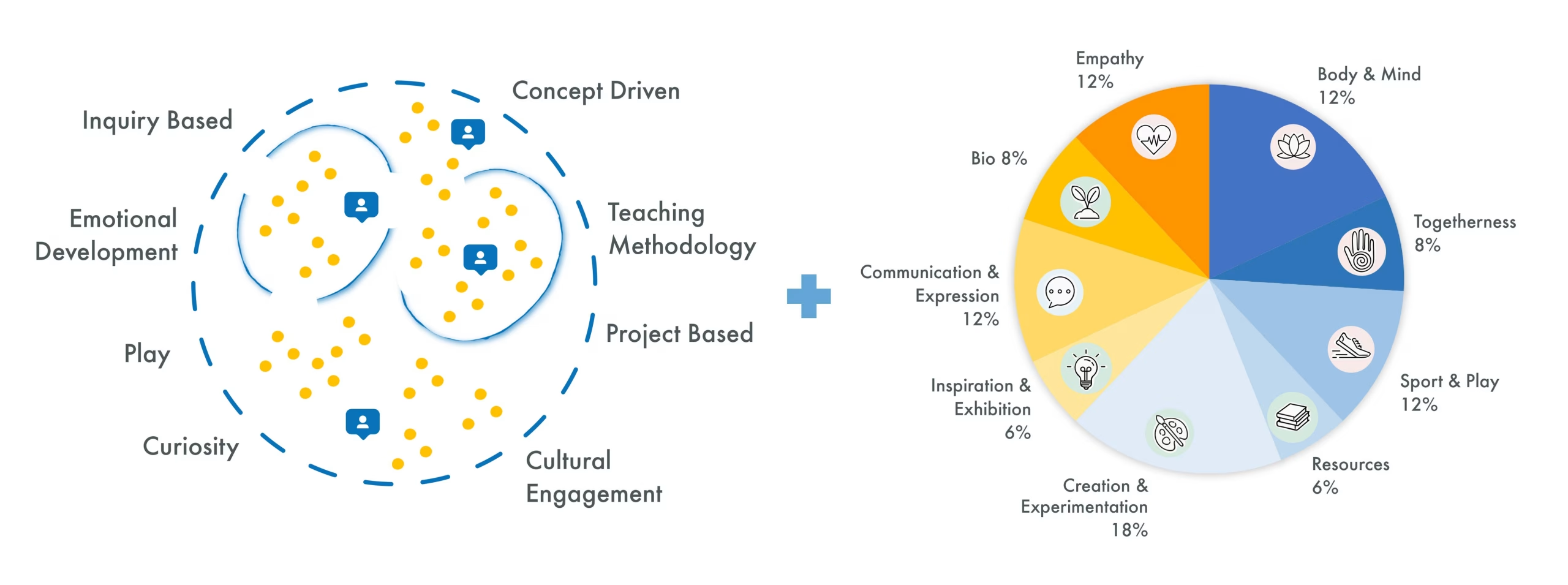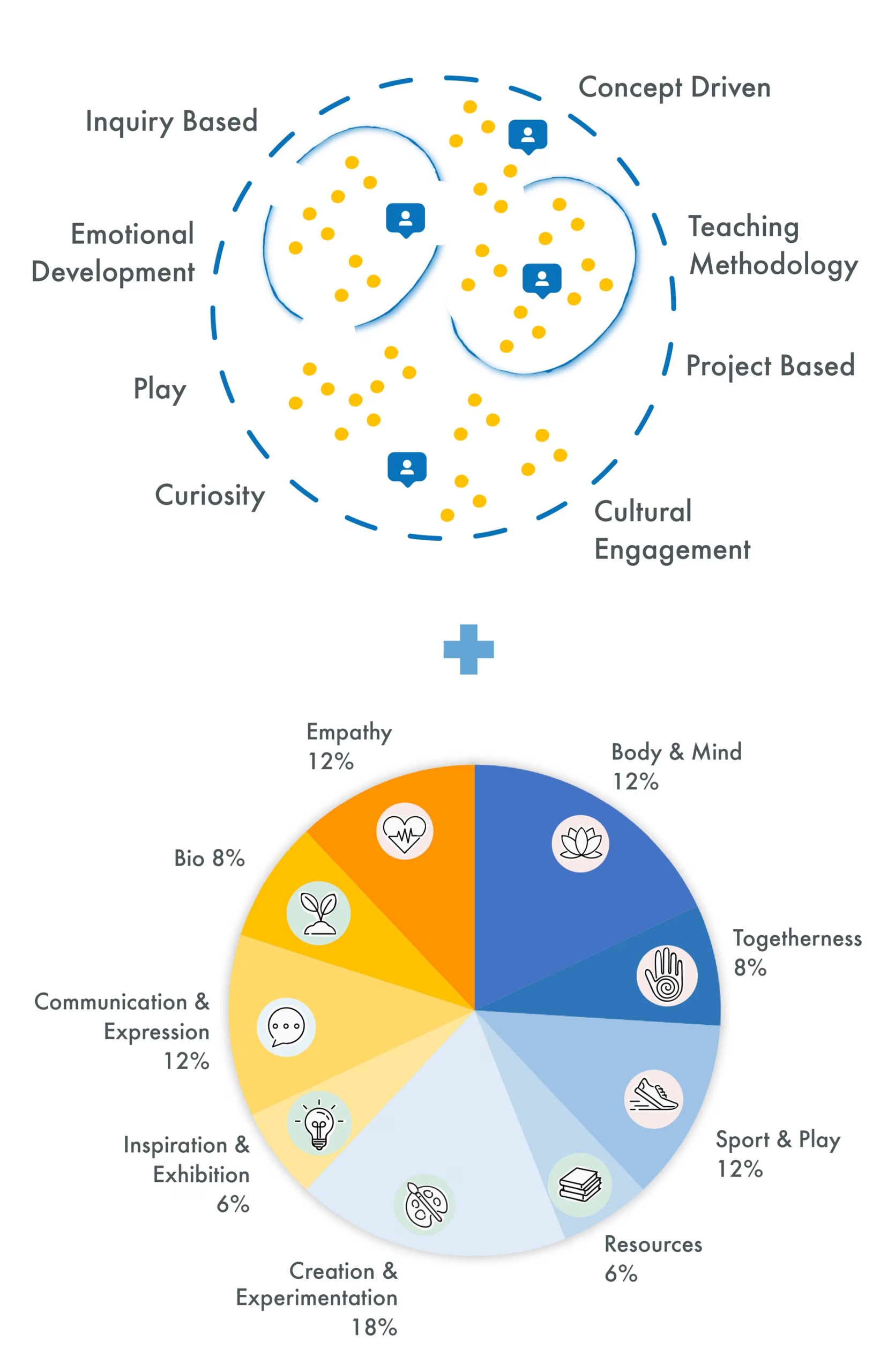3 to 6 years old
Early Years Programme
Early Childhood Learning
Building Strong Foundations
The Early Years Programme (EYP) marks the beginning of the International Baccalaureate journey and forms part of the Primary Years Programme. Designed for children aged 3 to 6, it emphasises whole-child development, encouraging growth not only inside the classroom but also through real-world experiences and varied learning environments.
At ISS Madeira, we implement the Primary Years Programme because it places the learner at the heart of the process. With an inquiry-led approach, the framework addresses children’s academic, social, physical, emotional, and cultural needs, creating a balanced and supportive foundation for lifelong learning.

Core Values at iss Madeira
Enhanced Learning Pathways
At ISS Madeira, students progress at their own pace, and traditional classroom settings can sometimes limit this flexibility. Our enhanced learning pathways allow students to tailor their learning journey while developing a range of essential skills along the way.
Multiculture
Communication & Expression
Students develop language skills and tools for effective communication, engage in cultural interaction, and participate in debates.
Inspiration & Presentation
Learners acquire language proficiency while expressing ideas through discussion, debate, and creative presentations.
Creation & Exploration
Hands-on activities encourage imagination, problem-solving, and practical skills, allowing students to create, construct, and experiment.
Care
Body & Mind
Students develop self-awareness, personal well-being, balance, and reflective practices to support growth and resilience.
Empathy
Learners cultivate understanding of others, practice emotional awareness, and embrace ethical responsibility in interactions.
Environment & Sustainability
Students learn to care for the world, engage with sustainable practices, and develop awareness and ecological responsibility.
Hospitality
Resources & Knowledge
Students develop reasoning and research skills while exploring libraries and curated learning collections.
Sports & Play
Physical activity promotes memory, teamwork, and personal empowerment, encouraging holistic development.
Togetherness
Learners strengthen social skills and build a sense of community, fostering connections within a supportive, family-like environment.
Our Beliefs for Early Learners
Learning Approaches in the Early Years
The ways children engage with learning in their early years play a vital role in their overall success and development across multiple domains.
By staying curious, focused, and actively involved in activities, children strengthen cognitive, language, social, and emotional skills, laying a solid foundation for lifelong learning.
Curiosity & Initiative
Students approach tasks with imagination, flexibility, and creativity. They show eagerness to explore ideas, ask questions, and seek new information.
Cooperation
Learners plan, initiate, and complete activities alongside peers, engaging in cooperative play, sharing knowledge, and supporting one another in group tasks.
Persistence & Focus
Students maintain interest and commitment to projects or activities until they are completed. They set goals, follow through on plans, and stay attentive even when facing challenges or distractions, developing resilience and determination in the process.

Learning Through Inquiry
Developing Skills Through Inquiry
In the Early Years, inquiry is at the heart of students’ daily learning. Driven by genuine curiosity, children are encouraged to explore, ask questions, and consider multiple possibilities as they discover the world around them.
This approach deepens knowledge and understanding by building on what students already know, guiding them toward thoughtful and responsible actions initiated by their own exploration.
Inquiry follows a structured process known as the Inquiry Learning Cycle, supporting students in developing critical thinking and problem-solving skills from an early age.
Early Years Learning Spaces
Exploring Independence within the Classrooms
In the Early Years Programme (ages 3–6), students are encouraged to explore independently while still benefiting from supportive care spaces. As they grow, they gain access to a wider variety of classrooms and learning environments that nurture their understanding of languages, cultures, and social interactions.
Through play and inquiry-based activities, children are inspired to follow their curiosity and deepen their learning. These experiences also help develop essential skills, including problem-solving, social interaction, and physical coordination.


